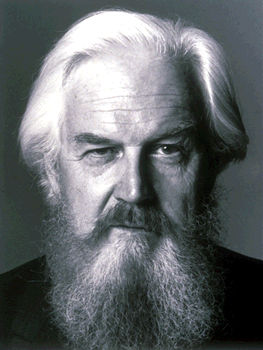Books |
Fifth Business
Robertson Davies
By
Published: Jan 31, 2024
Category:
Fiction
Do you know of the great Canadian writer Robertson Davies? You’d remember the look. Bearded. With an ascot. Though he died in 1995, he seemed like a character out of the 19th century, an actor in a dramatization of Dickens.
Davies did not need that eccentric self-presentation to get attention. His books made him a legend in Canada — and, thanks to “Fifth Business”, around the world.
And it all started with one image.
In 1960, Robertson Davies conjured a Christmas scene in a small town in Canada.
One ordinary thing happens: A boy throws a snowball at another boy.
“That was all there was to it,” he’d later recall, “but it came so often and was so insistent that I had to ask myself, Why is that boy doing that, and what is behind this, and what is going on?”
It turns out that there is a rock inside the snowball that Percy Boyd “Boy” Staunton throws at his friend Dunstan “Corky” Ramsey at 5:58 in the afternoon on December 27, 1908. It misses Ramsey — and hits Mrs. Dempster, wife of the Baptist parson, in the back of the head. She is extremely pregnant, and, when she falls, she goes into labor.
Her son, Paul, is born prematurely and must fight for life. Mrs. Dempster is said to be “touched”.
“Corky” Ramsey, age 10, is forever wracked with guilt because of the secret he cannot reveal: “I was perfectly sure, you see, that the birth of Paul Dempster, so small, so feeble, and troublesome, was my fault. If I had not been so clever, so sly, so spiteful in hopping in front of the Dempsters just as Percy Boyd Staunton threw that snowball at me from behind, Mrs. Dempster would not have been struck. Did I never think that Percy was guilty? Indeed I did.”
“Boy” Staunton forgets the incident entirely. But not forever….
The Modern Library judged “Fifth Business” 40th on its “reader’s list” of the 100 best novels of the 20th century. Its fans rate it higher. Robertson Davies is, for many readers, #1. And the story doesn’t necessarily end with this, Davies’ best novel. “Fifth Business” is the opening shot in the “Deptford Trilogy,” which fills 875 pages. So brace yourself. You may find yourself going right on to “The Manticore” and “World of Wonders.” Davies has that power. [To buy the paperback of “Fifth Business” from Amazon, click here. For the Kindle edition, click here. To buy “The Manticore,” click here. To buy “World of Wonders,” click here. To buy “The Deptford Trilogy — all three novels in one brick of a paperback — click here.]
What is “fifth business”? No one seemed to know, so the publisher asked Davies to explain it at the start of this book. He produced this:
Those roles which, being neither those of hero nor Heroine, Confidante nor Villain, but which were none the less essential to bring about the Recognition or the denouement were called the Fifth Business in drama and Opera companies organized according to the old style; the player who acted these parts was often referred to as Fifth Business.
His source: “purportedly Tho. Overskou, Den Danske Skueplads.” In 1979, the book’s Norwegian translator couldn’t find the citation. And Davies had to reveal: He made it up.
In plain English: Fifth Business is a name given to a character who is “neither hero nor heroine, confidante nor villain.” In short, a character of apparent unimportance. And yet this character is “essential to bring about the recognition” — he’s an agent of fate, one of those messengers sent to bring a single catalytic message. You’ve seen him in your own life: the guy who shows up one night and drops in your ear an insight you desperately need, the woman whose small act of kindness turns you in a new direction.
Here, I believe, that character is ”Corky” Ramsey, a comparative non-entity. And this is his life story. Kind of a turn-off — how compelling are the memoirs of a bachelor schoolmaster retiring after 45 years of service as a history teacher at a Canadian boys school? Just from your own experience of the men and women who taught you, you’d have to say: Not very.
In fact, Ramsey has had a magical life. I don’t want to give away the ending, but it completes the story of that snowball.
It turns out that ‘Fifth Business” is not just Ramsey’s memoir. In 272 brisk pages, it covers World War I, sex and love in the 1920s, investment strategies before the Crash of 1929, a magic trick that spawns a career. It’s a psychological thriller, and much more. It begins in the now and opens into the extraordinary. In a deceptive way, it’s a study of life itself — the large panorama, seen whole, encompassing both daily life and the realm of marvels. And that is why, for readers who like books that work on several levels, this is a completely addictive novel.


